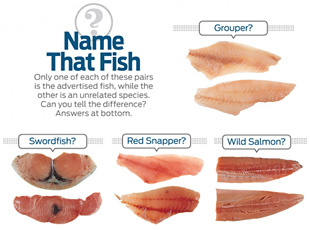Maryland Introduces Bill to Stop Seafood Fraud
A Maryland legislator is introducing the “Maryland Seafood Authenticity and Enforcement Act”, which the agency Oceana applauds. The legislation should help stop “seafood bait and switch” in that state.
 Are you sure that the fish and seafood you buy in the grocery store or at the fishmonger are properly labeled? Are you really buying red snapper, or a cheaper substitution? A Maryland legislator is introducing the “Maryland Seafood Authenticity and Enforcement Act”, which the agency Oceana applauds. The legislation should help stop “seafood bait and switch” in that state.
Are you sure that the fish and seafood you buy in the grocery store or at the fishmonger are properly labeled? Are you really buying red snapper, or a cheaper substitution? A Maryland legislator is introducing the “Maryland Seafood Authenticity and Enforcement Act”, which the agency Oceana applauds. The legislation should help stop “seafood bait and switch” in that state.
Seafood fraud is rampant in this country. A study by Oceana last year found that one-third of the seafood tested in the United States is mislabeled. Maryland Delegate Eric Luedtke (D-14) said in a statement, “to protect the public health, to protect the consumer, and to protect our watermen from unfair competition, Marylanders deserve to know that they are being served the seafood they ordered.”
Oceana campaign director Beth Lowell said in a statement, “this bill is an important step towards ensuring that the seafood sold in Maryland is accurately labeled. Providing consumers with more information about the seafood they purchase helps to protect our health, wallets and oceans. Consumers have a right to know more about their seafood, including what type of fish they are buying and serving to their families.”
Food Poisoning Bulletin has reported on this issue before. Oceana is working to get comprehensive traceability requirements in place for all seafood sold in this country. That information needs to follow the seafood through the supply chain from bait to plate.
Substituting one type of seafood for another can threaten your health because it may contain contaminants, toxins, or allergens. Seafood fraud also creates a market for illegal fishing, and is misleads consumers about the true availability of seafood.
Source: foodpoisoningbulletin.com


